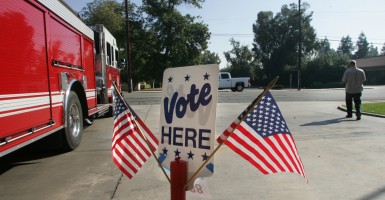President Obama suggested Wednesday that the U.S. should consider forcing all citizens to vote in elections.
“In Australia, and some other countries, there’s mandatory voting,” Obama said in a question and answer session in Ohio. “It would be transformative if everybody voted. That would counteract money more than anything.”
Obama is right: it would be “transformative” if all Americans were forced to vote—and almost certainly not in a good way.
That’s because a lot of Americans know very little about politics or government or policy.
Thirty-five percent of Americans can’t name a single branch of our government, according to a 2014 survey by the Annenberg Public Policy Center. And only around a third of Americans can name all three branches.
The ignorance doesn’t end there: 44 percent and 42 percent of respondents in the 2014 survey didn’t know which party controlled the House and Senate respectively—despite the fact that much of the political news in the past two years had been about the Republican House vs. the Democrat Senate.
Do we really want to force these Americans to vote?
Yes, it would be great if more Americans chose to vote: it’s appalling how low voter turnout is. In the 2014 midterms, only 36 percent of eligible voters went to the polls—the lowest percentage in seven decades. Even in 2012, only 57.5 percent of eligible voters voted—a much larger number, true, but still low.
After all, much as some Americans (including me!) might hate it, Washington has a significant effect on people’s lives. Votes at the federal level are shaping health care, taxes, the economy and religious liberty, just to name a few issues at stake.
People should care enough to vote. But they should also take seriously enough the responsibility of voting to learn at least the basics about issues and our political system. No, they don’t need to be a policy wonk or a constitutional scholar, but knowing, say, all three branches of government, would be a fantastic start.
But even if we did have mandatory voting, it’s not clear how that would affect the dynamics caused by the major spending on politics. And let’s be clear, it’s both sides that are spending big bucks, as this chart on 2014 election spending from the Center for Responsive Politics’ OpenSecrets.org shows:
But it’s confusing how exactly mandatory voting would affect spending. It’s true that would lead to neither side spending to increase turnout—although if both sides spend similar amounts to increase turnout, it effectively cancels out the effect of the spending. But what else would it do?
In fact, over at The Washington Post’s Volokh Conspiracy, George Mason University law professor Ilya Somin argues that mandatory voting could increase how much is spent on elections:
Most campaign spending represents expenditures on televised ads. For fairly obvious reasons, relatively ignorant voters are more likely to be influenced by simplistic 30 second ads than relatively well-informed ones (who, among other things, tend to have stronger preexisting views). Thus, a more ignorant electorate is likely to be one where campaign spending on television ads exercises more influence.
The current political system has a lot of problems. But none of them would be helped by forcing all eligible American citizens to vote.



























